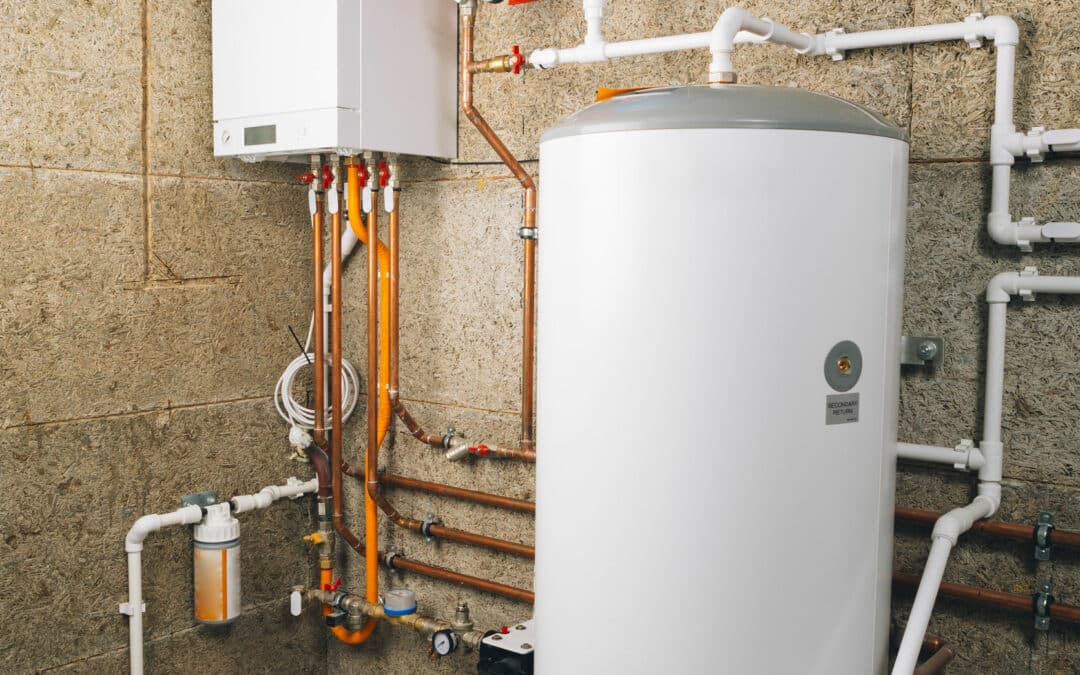One inevitable aspect of homeownership is maintaining and likely replacing your water heater at some point. Like most appliances, they don’t last forever. However, choosing the right option for your home and maintaining it can significantly increase its lifespan. In modern times, homeowners have options when it comes to choosing a water heater. In fact, shopping for one now can be intimidating because so many options are available. To make things easier, we will discuss a few of the most popular types of water heaters on the market, how they function, and what steps to take to keep yours running smoothly for years.
Conventional Tank Water Heaters
Tank water heaters were the standard in homes for many years and remain the most common choice today. These heaters store hot water in an insulated tank until needed somewhere in the house (i.e. faucet, shower, etc). After sending the hot water to where it is needed, the tank then fills up again with cold water and proceeds to heat this new batch to repeat the process.
In terms of powering these – this can be done via electricity, gas, or even oil or propane. While the natural gas option is likely more expensive upfront, it increases energy efficiency, saving you money over time.
Conventional water heaters can only heat as much water as it can hold. So, it is important to correctly choose the size you install based on your household size and water usage. These tank water heaters are versatile and come in sizes that suit any household. They also cost less than their tankless counterparts, and are relatively easy to maintain. There are some drawbacks, however. The average lifespan of the average tank water heater is only around 10-15 years. Additionally, while the energy efficiency of these has improved over the years, they still require a lot of energy (especially during the winter months). In some cases, the tank can fail, making the risk of flooding a factor to consider as well when purchasing a tank water heater.
Maintaining your tank water heater helps to increase its lifespan and ensure you always have hot water. You can do this by emptying and cleaning the tank once or twice a year. This allows you to remove built-up sediment that leads to erosion inside. Doing so helps your tank remain in working condition for as long as possible. It’s also beneficial that you test the pressure relief valve regularly.
Tankless Water Heaters (On-Demand)
Rising in popularity is the installation of tankless water heaters in homes. Unlike conventional counterparts, tankless ones do not keep a storage of heated water at all times. These heaters function and heat water on-demand. When required, water passes through a system of coils that heat it and then send it throughout the home.
Tankless water heaters are generally much smaller than conventional ones. Also, because it can heat water on demand, it doesn’t waste energy keeping a full tank of hot water ready at all times. According to the U.S. Department of Energy, this means that tankless water heaters are between 8-34% more energy-efficient than those with tanks. That number fluctuates depending on water usage. This energy efficiency leads to less expensive energy bills over the lifetime of the unit (which is also about ten years longer than tank water heaters). However, there are some downsides. The upfront cost of these is significantly higher, and older homes with outdated electrical wiring may not be set up to support them.
Maintenance for tankless water heaters is similar to conventional heaters. Cleaning once or twice a year keeps buildup and corrosion to a minimum. As this is more difficult with these heaters and many parts are hard to reach, it is best to have a professional come flush the unit.
Alternative Water Heaters
Conventional and tankless water heaters are by far the most common in U.S. households. However, some homeowners choose alternative options that best suit their home.
- Heat Pump Water Heaters: Electricity powers heat pump water heaters, which draw heat in from the environment and intensifies and moves it around rather than generating it on its own. This type works best in warmer climates, where it is very much an energy-efficient alternative. These heaters have air filters that need regular cleaning on top of flushing and cleaning the heater once a year.
- Solar Water Heaters: As the name implies, these water heaters rely on the sun for power. Each unit includes a solar energy collector (often located on the roof or other sunny area) and a storage tank. Water distribution from the tank to areas of the home either happens actively with a pump or passively via gravity. Maintenance depends on the type of system used, but includes routine inspections from an installer every couple of years as well as regularly checking the insulation isn’t damaged.
- Smart Water Heaters: Joining the team of smart home appliances, these heaters allow homeowners to control features such as temperature settings from a mobile device. Additionally, smart water heaters alert owners when leaks are detected, and automatically initiates cleaning if it detects bacteria.
Choosing the Best Water Heater for Your Home
With more options than ever to heat the water in your home, the choice can be overwhelming. Household size, water usage, location, and budget all factor into the decision. Luckily, your local plumber is a great resource. Whether your existing one needs to be repaired or replaced or you are starting from initial installation, the team at Flotechs brings years of knowledge and expertise around all types of water heaters. We are happy to answer questions and advise you on the best option for your home based on your needs and goals. To get started, contact us today!



